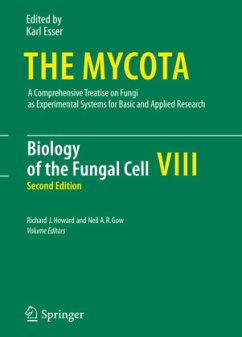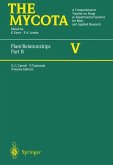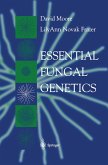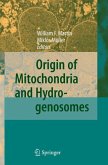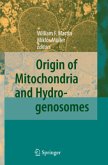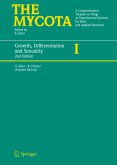Mycology, the study of fungi, originated as a subdiscipline of botany and was a descr- tive discipline, largely neglected as an experimental science until the early years of this century. A seminal paper by Blakeslee in 1904 provided evidence for sel?ncompatib- ity, termed heterothallism , and stimulated interest in studies related to the control of sexual reproduction in fungi by mating-type speci?cities. Soon to follow was the demonstration that sexually reproducing fungi exhibit Mendelian inheritance and that it was possible to conduct formal genetic analysis with fungi. The names Burgeff, Kniep and Lindegren are all associated with this early period of fungal genetics research. These studies and the discovery of penicillin by Fleming, who shared a Nobel Prize in 1945, provided further impetus for experimental research with fungi. Thus began a period of interest in mutation induction and analysis of mutants for biochemical traits. Such fundamental research, conducted largely with Neurospora crassa,led to theone gene: one enzyme hypothesis and to a second Nobel Prize for fungal research awarded to Beadle and Tatum in 1958. Fundamental research in biochemical genetics was extended to other fungi, especially to Saccharomyces cerevisiae, and by the mid-1960s fungal systems were much favored for studies in eukaryotic molecular biology and were soon able to compete with bacterial systems in the molecular arena.
From the reviews of the first edition
"The volume is well illustrated and certainly realizes the primary aim of "The Mycota", namely to highlight developments in both basic and applied research into fungal systems." (Microbiology Today)
"The Editors´ aim 'to provide a selected sampling of contemporary topics at the forefront of fungal cell biology' has certainly been achieved. Indeed, it is hard to imagine any mycologist not finding something fascinating in each of the chapters. ... Further, the volume is packed with material that will be extremely useful for those presenting basic courses in mycology - especially because of the many fine explanatory line drawings." (Mycological Research)
"The editors have done a magnificant job, and every chapter repays careful reading. ... This book will be extremely valuable to all scientists, not only mycologists sensu stricto, whose work involves experimentation with fungi. I would recommend it not only for library purchase, but also to individual scientists wanting an up-to-date overview of some of the most interesting advancing fields in fungal cell biology. It is beautifully produced in typical Springer style, and although expensive it is excellent value for money." (Mycologist)
"The volume is well illustrated and certainly realizes the primary aim of "The Mycota", namely to highlight developments in both basic and applied research into fungal systems." (Microbiology Today)
"The Editors´ aim 'to provide a selected sampling of contemporary topics at the forefront of fungal cell biology' has certainly been achieved. Indeed, it is hard to imagine any mycologist not finding something fascinating in each of the chapters. ... Further, the volume is packed with material that will be extremely useful for those presenting basic courses in mycology - especially because of the many fine explanatory line drawings." (Mycological Research)
"The editors have done a magnificant job, and every chapter repays careful reading. ... This book will be extremely valuable to all scientists, not only mycologists sensu stricto, whose work involves experimentation with fungi. I would recommend it not only for library purchase, but also to individual scientists wanting an up-to-date overview of some of the most interesting advancing fields in fungal cell biology. It is beautifully produced in typical Springer style, and although expensive it is excellent value for money." (Mycologist)
From the reviews of the first edition
"The volume is well illustrated and certainly realizes the primary aim of "The Mycota", namely to highlight developments in both basic and applied research into fungal systems." (Microbiology Today)
"The Editors´ aim 'to provide a selected sampling of contemporary topics at the forefront of fungal cell biology' has certainly been achieved. Indeed, it is hard to imagine any mycologist not finding something fascinating in each of the chapters. ... Further, the volume is packed with material that will be extremely useful for those presenting basic courses in mycology - especially because of the many fine explanatory line drawings." (Mycological Research)
"The editors have done a magnificant job, and every chapter repays careful reading. ... This book will be extremely valuable to all scientists, not only mycologists sensu stricto, whose work involves experimentation with fungi. I would recommend it not only for library purchase, butalso to individual scientists wanting an up-to-date overview of some of the most interesting advancing fields in fungal cell biology. It is beautifully produced in typical Springer style, and although expensive it is excellent value for money." (Mycologist)
"The volume is well illustrated and certainly realizes the primary aim of "The Mycota", namely to highlight developments in both basic and applied research into fungal systems." (Microbiology Today)
"The Editors´ aim 'to provide a selected sampling of contemporary topics at the forefront of fungal cell biology' has certainly been achieved. Indeed, it is hard to imagine any mycologist not finding something fascinating in each of the chapters. ... Further, the volume is packed with material that will be extremely useful for those presenting basic courses in mycology - especially because of the many fine explanatory line drawings." (Mycological Research)
"The editors have done a magnificant job, and every chapter repays careful reading. ... This book will be extremely valuable to all scientists, not only mycologists sensu stricto, whose work involves experimentation with fungi. I would recommend it not only for library purchase, butalso to individual scientists wanting an up-to-date overview of some of the most interesting advancing fields in fungal cell biology. It is beautifully produced in typical Springer style, and although expensive it is excellent value for money." (Mycologist)

